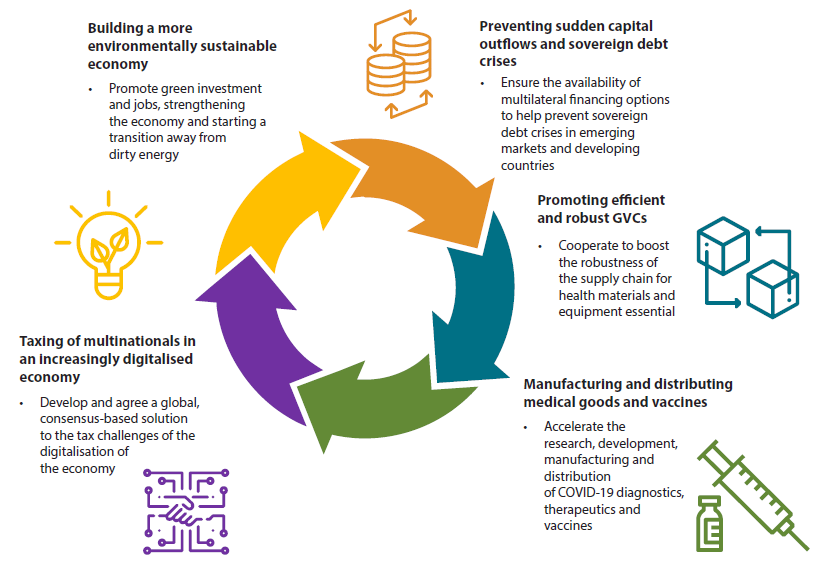New horizons: Structural policies for a strong recovery and a sustainable, inclusive and resilient future
Background
In support of the G-20, this report discusses structural reform options to support a strong, sustainable, balanced and inclusive economic recovery from the COVID-19 pandemic recession.
The COVID-19 pandemic is the largest global economic shock in decades and is causing a loss of lives and a deep recession in 2020. The virus continues to spread in many regions of the world, and many countries are experiencing a resurgence of cases. The immediate policy challenge is to contain the continual spread – and any new outbreaks – of the virus, while minimising the collateral economic and social damage. Containing the virus requires efforts to ensure widespread testing, effective and timely tracking, and tracing, social distancing, and use of masks and the continuation of certain targeted containment measures to control local outbreaks. Fiscal and monetary policy support needs to be maintained to preserve confidence and limit uncertainty. Crisis-related support policies should be flexible and state-contingent, evolving as the recovery progresses to ensure assistance to households, workers, and firms and focus on viable jobs and companies.
Exceptional crisis related policies need to be accompanied by the structural reforms most likely to raise opportunities for displaced workers and strengthen economic dynamism, allowing the reallocation of labour and capital resources towards sectors and activities with the strongest growth potential. Governments’ structural policies acting on three main fronts are crucial for an inclusive, and sustainable economic recovery.
Executive Summary
A three-pillar strategy for a strong, inclusive and sustainable recovery
The global economy requires policy support to exit the crisis. This involves maintaining fiscal and monetary support while adapting short-term crisis-related measures, introducing some new policies and targeting policies where they would be most effective. Governments’ structural policies acting on three main fronts are crucial for an inclusive, and sustainable economic recovery:
Pillar 1: Facilitate people, companies and capital to shift to where prospects are more promising
Facilitating the reallocation of resources and boosting productivity and growth by adapting job retention schemes to encourage job search, removing barriers to worker mobility (e.g. excessive occupational licensing) and firm entry, increasing competition (e.g. adapting competition law to the digital age) and facilitating firm restructuring (e.g. effective insolvency regimes and diverse financing instruments).
- Use competition and regulatory policies to ensure dynamic, fair and productive markets
- Deal with corporate debt and insolvency
- Make the most of digital tools
Pillar 2: Help workers find new jobs, learn new skills and protect incomes
Supporting people to find new jobs via re-skilling and job placement policies. There should be a strong emphasis on building digital skills – especially for the low skilled and other vulnerable groups – while the provision of paid sick leave and adequate unemployment benefits are essential to strengthen income protection.
- Ensure income support is adequate and targeted
- Retain viable jobs and enable transitions
- Support workers to upskill and reskill
Pillar 3: Make the economy more sustainable and resilient to future shocks
Reinforcing sustainability and resilience through increasing public and private investments, especially in health systems, digitalisation, education and training, and lowering emissions; while improving the robustness of fiscal positions by reviewing public spending and shifting towards broader, more diverse revenue sources.
- Coordinate a health response in the short and long term
- Ensure debt sustainability over the medium term and address sovereign debt crises in the poorest countries’
- Provide incentives for low-carbon investment
- Build more resilient supply chains
Stronger international co-operation is needed: G20 countries together can lead the way in building a resilient and long-lasting recovery, tackle inequalities and safeguard the planet.
The COVID-19 crisis has highlighted the need for stronger international co-operation in five key areas.
The Secretary-General of @OECD, Angel Gurría, highlights the collective work by the #G20 which provided a powerful policy response to the pandemic. #G20Riyadhsummit pic.twitter.com/upcni2loAa
— G20 Saudi Arabia (@g20org) November 22, 2020
